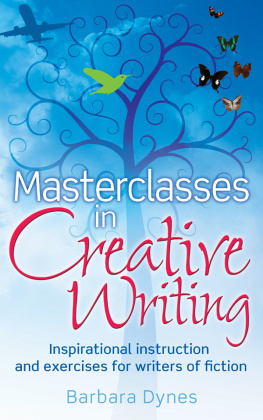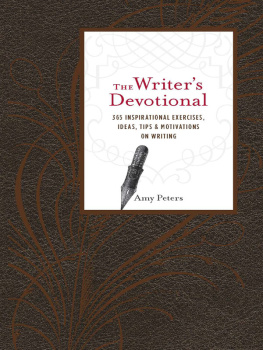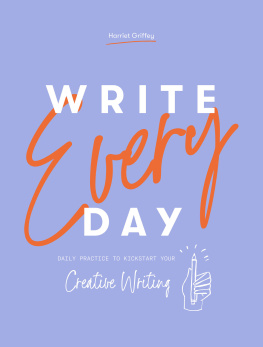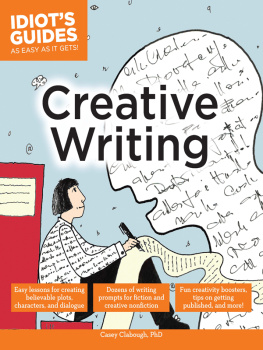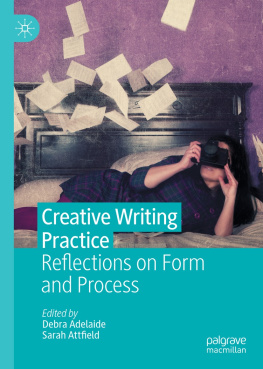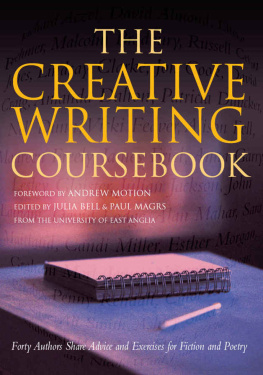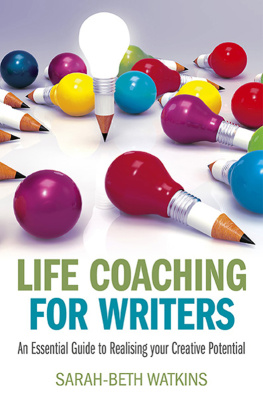Barbara Dynes has been a professional writer for over thirty years and has had hundreds of short stories and articles published by magazines. She has previously had two non-fiction books published, written jointly with her husband, Robin Dynes. Barbara is currently a columnist for Writers Forum magazine and has worked as a creative writing tutor and lectured in the subject for many years.
Other titles from How To Books
365 WAYS TO GET YOU WRITING
Jane Cooper
GET WRITING CHILDRENS FICTION
Karen King
HOW TO WRITE YOUR FIRST NOVEL
Sophie King
THE FIVE-MINUTE WRITER
Margret Geraghty
LIKELY STORIES
Hugh Scott
MASTERCLASSES IN CREATIVE WRITING
Barbara Dynes

With love and special thanks to my husband, Robin, for his invaluable help and support.
To Derek and Kevin, from their computer-dumb Mum, with love. And to all my writing students and friends, from whom I have learned so much.
Constable & Robinson Ltd
55-56 Russell Square
London WC1B 4HP
www.constablerobinson.com
First published in the UK by How To Books,
an imprint of Constable & Robinson Ltd., 2014
Copyright Barbara Dynes 2014
Every effort has been made to obtain the necessary permissions with reference to copyright material, both illustrative and quoted.
We apologise for any omissions in this respect and will be pleased to make the appropriate acknowledgements in any future edition.
The right of Barbara Dynes to be identified as the author of this work has been asserted by her in accordance with the Copyright, Designs & Patents Act 1988
All rights reserved. This book is sold subject to the condition that it shall not, by way of trade or otherwise, be lent, re-sold, hired out or otherwise circulated in any form of binding or cover other than that in which it is published and without a similar condition including this condition being imposed on the subsequent purchaser.
A copy of the British Library Cataloguing in Publication
Data is available from the British Library
ISBN 978-1-84528-511-1 (paperback)
ISBN 978-1-47211-003-9 (ebook)
Printed and bound in the UK
1 3 5 7 9 10 8 6 4 2
Cover by Bob Eames
CONTENTS
INTRODUCTION
Welcome to the world of creative writing. Whilst teaching the subject, I became aware that students often had their own individual stumbling block regarding certain aspects of writing. For instance, some could not grasp viewpoint, some were conscious of using stilted dialogue or adding corny endings. Students suggested that a dip into a reference book that pulled no punches and concentrated on the nitty-gritty, could be the answer.
So here is that dip into book, where you can go straight to your particular problem. But I hope that you will also gain confidence and enjoyment from the other lessons which, together with the exercises, are aimed at getting new writers into print and improving the work of those already published. The exercises should also be fun to do if you are writing for pleasure.
The approach that authors take the attitude they have towards writing is so important. Over the years I have had brilliant students who, sadly, were unwilling to do the hard work required, and not so brilliant ones who, fantastically, would slog away at it. Guess which are successful today
There are no real rules in creative writing, but you do need to learn the basics and these lessons are aimed at keeping you writing, in spite of those blocks. There is nothing more satisfying than finishing your own story or novel, so get down to it.
Read the good authors and keep writing!
AUTHORS NOTE
Throughout the book, please read he to encompass both men and women. No sexism intended!
SECTION ONE:
GETTING STARTED
(1)
HAVING THE RIGHT ATTITUDE
Attitude is everything! Anyone, given a surge of enthusiasm and a brilliant idea, can start writing a novel or a story. But lack the right attitude towards your creation and it will never get finished. Writing can be fun, enjoyable and wonderful therapy. It can also, like everything else worth doing, be surprisingly hard work.
Before you start to write, spend a few moments thinking about what you are about to do. Why do you want to do it? For fun just to see if you CAN do it in order to create something because youve always loved words? Or maybe youre deadly serious and hope to sell your work? Whatever, even if youve never written anything creative before, you need to get into a positive frame of mind about it and be determined to finish what you start. The Ill-just-scribble-a-few-words-and-see-where-they-take-me attitude is not always good. OK, it gets you started, but your first surge of enthusiasm is likely to peter out and yet another creative piece comes to nothing.
Whatever stage you are at, be positive about any writing you attempt. Giving yourself a deadline (a completion date) and sticking to it helps enormously. You need to make a solid commitment about your writing: you are no dabbler, you intend to produce a complete story or a whole novel. Even if you are doing it just for fun, youll get much more satisfaction from your creation if you manage to finish it. So, remember: attitude is everything!
MASTERCLASS EXAMPLE
I dont know anything about inspiration because I dont know what inspiration is Ive heard about it, but I never saw it.
(William Faulkner)
TOP TIP
Think youre not in the mood? No matter sit in front of your computer and write something. Anything! Keep going, then read it back. Among that jumble of words you will find something that interests you. Leap on it its a start!
HAVING THE RIGHT ATTITUDE THE MAIN POINTS
Be positive
Give yourself a deadline
Finish the piece and enjoy the satisfaction of producing something creative
Exercise 1
Fill in the following:
Why do you want to write? (to sell your work, for fun, therapy)
_________________________________________________
MY COMMITMENT IS:
I shall start my story on _____________________________________________
I shall write at least _______ words every time I go back to it
I shall finish my story by _________________________________
Signature ________________________________________________
Now, sign your statement go on! You have made a commitment.
By signing it you are reminding yourself how absolutely committed you are. This way, you WILL keep to it!
Exercise 2
Sit in front of the computer and just write. Write any old rubbish about the colour of the wall over the top of your machine, the electricity bill on your desk, waiting to be paid. Supposing you didnt pay it? You would have no lighting, no heating. Youd have to go to a caf to get warm; who might be in that caf
Just keep writing anything. I guarantee some spark of an idea will emerge!
(2)
FINDING AND RECOGNISING IDEAS
Are you one of those writers who are never short of an idea? Some peoples notebooks or computers are full of them. These lucky folk have so many ideas they dont know which to use first. If you find good ideas are a rarity, youll be envious of that first group.
Well, take heart! Those writers teeming with ideas are not always the ones who produce the most work. The danger is that they can start on one project, hit a snag and, whilst searching for a solution, recall that other brilliant idea just waiting to be worked on and abandon the first. Some authors never finish anything, which is a sad state of affairs. It is tempting to move on to another perhaps more exciting project, but not very productive if the first piece never gets finished. Usually, those who find ideas hard to come by do not have this problem. They are so relieved to get a rare, workable one that they tend to stick with it to the end!
Next page
